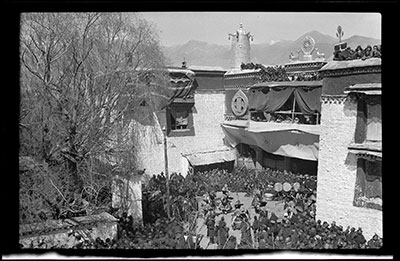
2001.59.9.3.1 (Film negative)


2001.59.9.3.1 (Film negative)

Hugh E. Richardson
Hugh Richardson
April 10th 1937, April 18th 1939 or April 6th 1940
Lhasa > Jokhang (from Doring House)
2001.59.9.3.1
55 x 85 mm
Ritual Activity , Dancing
Negative film nitrate
Donated August 2001
The executors of the estate of Hugh E. Richardson
Hugh E. Richardson
Manual Catalogues - Notes on negative album - 'A'. CEREMONIES. SCAPEGOAT. SERPANG. ORACLE KARMASHAR. CHIPGYUR. LHA BSDUR NECHUNG. YASO. LUKHANG BOATS. GANGTOK WARRIORS.'
Manual Catalogues - Notes on negative index - 'Lu gong at Jokhang prayer' 'Black hat dancers' (red ink) is written in Richardson's hand on a piece of paper glued onto the first page of the negative album. [KC 20/9/2006]
Manual Catalogues - Richardson's handlist Album 'A' - 'Nos 1-20 illustrate the Scapegoat ceremony,the Glud-'gong rgyal-po , on the 29th day of the second month. no.2 The Kashag are seated in a balcony overlooking the courtyard in front of the Jokhang; and the Zhal-ngo -the Proctors of Drepung- are seatred on the north side of the courtyard. The ceremony starts with a dance by Black Hat "magician" dancers. nos. 3 and 4 also show the dance.' [KC 20/9/2006]
Other Information - Setting: Richardson mentions that he saw this ceremony on three occasions so one can assume that the photographs of the ceremony are from three different occasions. He provides a very full description of the proceedings in Ceremonies of the Lhasa Year, 1993, London: Serindia Publications, pp. 61-71, "In this ceremony two men dressed in shaggy goatskins and with their faces painted half black and half white are driven out of the city in a performance which has a superficial resemblance to the ritual recorded in other civilizations where a scapegoat is expelled bearing with him the sins of the people. ... of the two men on whomthe burden fell one was a poyen , servant, of the magistrates of the Sho whose other duties were to flog criminals and look after the neighbouring parks; the other was chosen by the villagers of Phenpo who were tenants of the Kundeling monastery in Lhasa. (p.62) Unlike the majority of ceremonies at Lhasa this one does not start until midday. By then a crowd has gathered around the courtyard in front of the main entrance to the Jokhang. Then the two Shengo of Drepung with their deputies,attended by brawny monk police carrying long poles, staves and sticks, march gravely across the courtyard and sit on a bench below the Dalai Lama's window. A long blaast from two silver horns on the west side of the courtyard announces the emergence from the Jokhang of the Changchubling monks who perform a short ritual of exorcism to the accompaniment of oboes and cymbals. When that is finished a party of Black Hat (Shanak) monk dancers, also from Chanchubling, wearing tall broad-brimmed hats surmounted by flame-like fretwork and a conical gold ornament, perform the slow pirouettes of their tantric dance, gesturing with wide, flowing sleeves and holding a skull cap in one hand and a dorje in the other. While they dance the lopon, the senior teacher of Changchubling, enveloped in a red cloak and wearng a yellow mitre, comes to sit on a high cushioned seat facing the Dalai Lama's window." p. (64-5).
For Citation use:
The Tibet Album.
"Lugong ceremony outside the main entrance to the Jokhang"
05 Dec. 2006. The Pitt Rivers Museum.
<http://tibet.prm.ox.ac.uk/photo_2001.59.9.3.1.html>.
For more information about photographic usage or to order prints, please visit the The Pitt Rivers Museum.
© The Pitt Rivers Museum